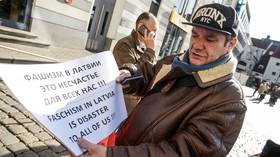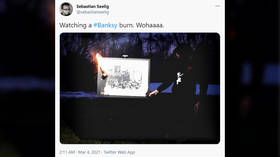Latvia marginalizing native Russian-speakers with ‘restrictive policies’ driven by ‘political agenda,’ Council of Europe warns

A bombshell report by Europe’s human rights watchdog has slammed Latvian politicians for creating a hostile environment toward native Russian speakers, who make up around one in four of the former Soviet Republic’s population.
The new research from the Council of Europe, founded in the wake of WWII to uphold the rule of law across much of the continent, was adopted by a Committee of international ministers on Wednesday. It found that, while the Baltic country is making “sustained efforts” to teach Latvian to minority groups, its efforts to homogenize society are infringing the rights of Russian-speakers.
“Society in Latvia continues to struggle with the consequences of past divisions,” it argued, with “the Latvian majority and the Russian minority holding different geopolitical viewpoints and cultural identities. Persons belonging to each of these groups have significantly different perceptions of history and of the state in which they would wish to live. Attempts to create a cohesive society based on civic identity have not advanced significantly in recent years.”
A series of measures aimed at reversing the ‘Russification’ of the country have been imposed, the Council warned, highlighting that tough rules on the ability to speak Latvian are harming professionals, and even politicians. “Increasingly strict Latvian language proficiency requirements are applied to virtually all professions,” the report says, arguing that “such broad scope of application of linguistic requirements adversely affects the possibility for non-native speakers of Latvian.” Those rules, it claimed, have even “been used to terminate mandates of elected municipal council members.”
At the same time, the watchdog blasted Riga because “cases of inflammatory statements by public figures have not led to the authorities taking sufficient action, creating an impression of impunity and ambivalence, thus affecting negatively the interethnic climate.”
In the sternly worded missive, diplomats insisted that “restrictive policies and other pressures driven by a political agenda, rather than evidence-based decision-making, are particularly evident in the education system, the media, and with regard to the use of national minority languages in many areas of public life.”
Earlier this week, Latvia’s President Egils Levits told a parliamentary session that the country could, by 2030, become “one of the most modern European countries.” However, over that same period, he argued that Latvia will “also become a Latvian state” tied to “the elements of Latvianism – language and culture – which distinguish us from other countries.”
Also on rt.com Iron curtain on the airwaves: Latvia becomes latest country to censor Russian TV shows, as Moscow diplomats slam new crackdownEthnic Russians account for around a quarter of the country’s population and as many as half of those in the capital. Ethnic Latvians also have high rates of Russian proficiency, with 71 percent thought to have a command of it. Russian is an official language in 11 nations and claims more than a quarter of a billion speakers. Latvian, by contrast, is spoken by only 1.75 million people, mostly within the country.
However, Latvian is the only official tongue approved by Riga and, in 2012, a referendum blocked proposals to also afford that same status to Russian. Then-President Andris Berzins criticized the idea as “absurd,” saying “there’s no need for a second language. Whoever wants can use their language at home or in school.”
Like this story? Share it with a friend!















